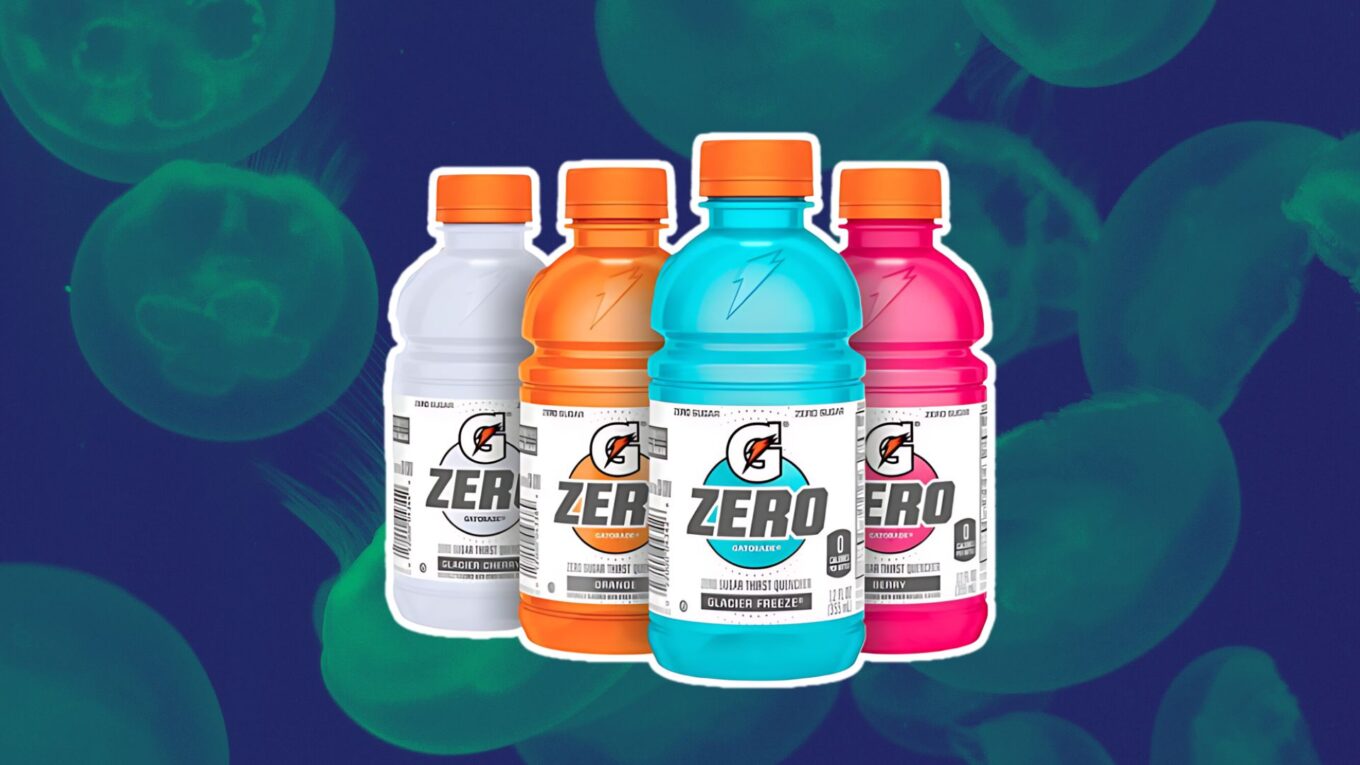Gatorade Zero has become a popular choice for many athletes and fitness enthusiasts. But is Gatorade Zero good for you? This question sparks debate among health-conscious consumers.
You might think a zero-sugar sports drink sounds ideal. However, there’s more to consider than just the lack of sugar.
Many people don’t know the full story behind Gatorade Zero’s ingredients and effects. This article will examine the facts, helping you understand what’s in your bottle.
We’ll examine how Gatorade Zero impacts your body, its pros and cons, and how it compares to other hydration options.
You’ll have the information to decide if it fits your health goals by the end. Let’s explore the truth about this well-known sports drink.
Understanding Gatorade Zero
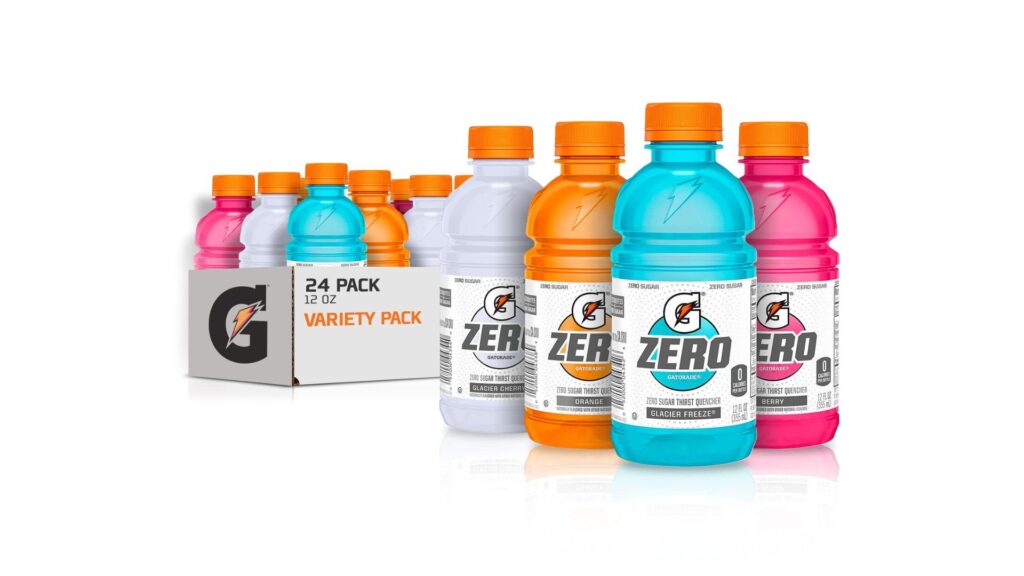
Let’s start by looking at Gatorade Zero. We’ll explore where it came from, why it was created, and how it’s different from regular Gatorade.
History and Development
Gatorade’s story began in 1965 at the University of Florida. A team of scientists created it to help the school’s football team stay hydrated during hot, intense practices.
The drink quickly gained popularity among athletes for its ability to replace fluids and electrolytes lost through sweat.
As health awareness grew, consumers started looking for options with less sugar. In response, Gatorade Zero was introduced in 2018.
This new version aimed to provide the same hydration benefits as the original, but without the sugar and calories.
Composition and Ingredients
Gatorade Zero contains several key ingredients, such as
- Water: The main component for hydration.
- Electrolytes: Sodium and potassium to replace what’s lost through sweat.
- Artificial sweeteners: Sucralose and acesulfame potassium for taste without sugar.
- Citric acid: For flavor and as a preservative.
- Natural and artificial flavors: To create various taste options.
- Food coloring: Depending on the flavor.
Compared to regular Gatorade, the Zero version has no sugar or carbohydrates. It also has very few calories – typically less than 5 per serving. However, both versions contain similar amounts of electrolytes.
The main difference lies in how they’re sweetened. Regular Gatorade uses sugar, while Gatorade Zero relies on artificial sweeteners.
This change allows Gatorade Zero to maintain a sweet taste without the added calories and sugar of the original formula.
Is Gatorade Zero Good for You?
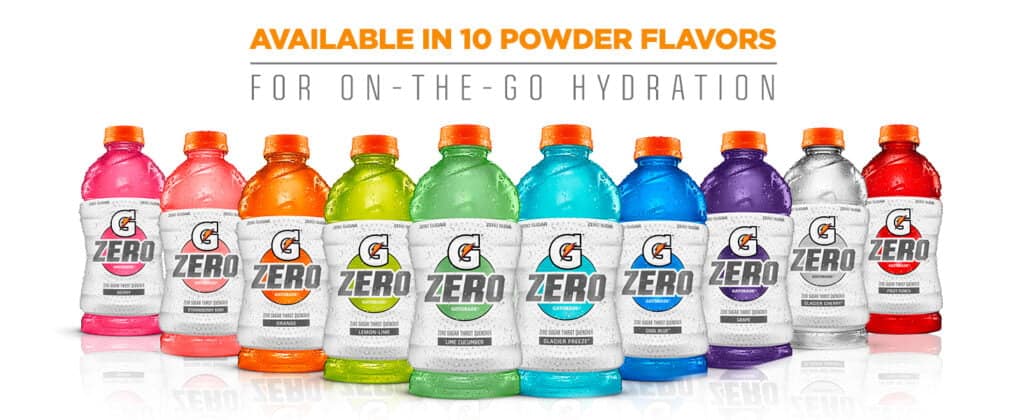
Many people want to know. In this section, we’ll examine Gatorade Zero’s strengths and weaknesses, check its nutrition facts, and consider how it might affect your health.
Nutritional Pros
Gatorade Zero offers several potential benefits. It contains no sugar and very few calories, making it suitable for those watching their calorie or sugar intake.
Like regular Gatorade, it provides electrolytes such as sodium and potassium, which can help replace what’s lost through sweat during exercise.
It’s also free from caffeine and major allergens, making it accessible to many consumers.
Nutritional Cons
However, Gatorade Zero comes with some drawbacks. It relies on artificial sweeteners like sucralose and acesulfame potassium.
While these provide sweetness without calories, some studies suggest potential health concerns, including possible effects on gut bacteria, insulin sensitivity, and metabolism.
Additionally, depending on the flavor, Gatorade Zero contains artificial colors, which some research has linked to various health issues.
The long-term impact of regularly consuming these artificial ingredients is not fully understood.
When deciding if Gatorade Zero is good for you, it is important to weigh these pros and cons against your personal health needs and goals.
Common Myths and Misconceptions
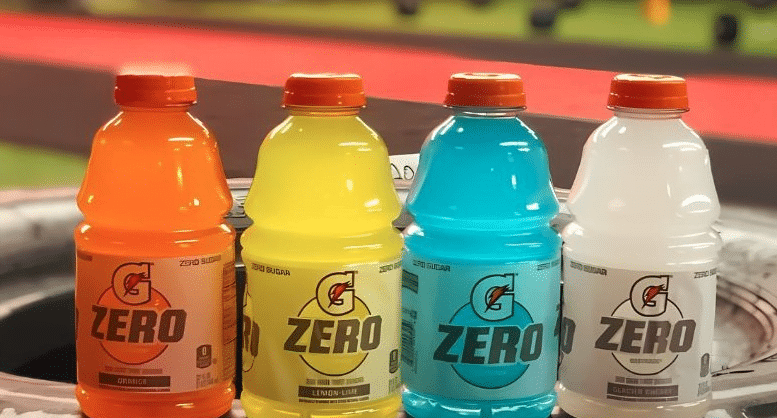
There is a lot of wrong information about Gatorade Zero out there. We’ll look at some common wrong ideas and give you the real facts based on science.
1. Myth: Gatorade Zero is Completely Healthy
The Reality of Artificial Sweeteners
Many people believe that because Gatorade Zero has no sugar, it must be entirely healthy. However, this isn’t the full picture.
Gatorade Zero contains artificial sweeteners like sucralose and acesulfame potassium. While these substances provide sweetness without calories, they’re not without potential concerns.
Scientific Studies on Health Effects
Some studies suggest that sucralose might affect gut bacteria and insulin sensitivity. Research on acesulfame potassium is limited, but some studies indicate possible effects on metabolism.
It’s important to note that while these artificial sweeteners are FDA-approved, the long-term effects of regular consumption are still being studied.
2. Myth: Gatorade Zero is Necessary for Hydration
Comparing Hydration Options
Another common misconception is that Gatorade Zero is essential for proper hydration.
In reality, plain water is usually sufficient for most people engaged in moderate exercise or daily activities. Coconut water is another natural alternative that provides electrolytes.
When Gatorade Zero Might Be Beneficial
Gatorade Zero might be beneficial in specific situations, such as intense, prolonged exercise lasting more than an hour or very hot conditions where you sweat a lot.
However, staying hydrated is not necessary for the average person. When choosing a hydration strategy, it’s always best to consider your individual needs and activities.
Health Considerations
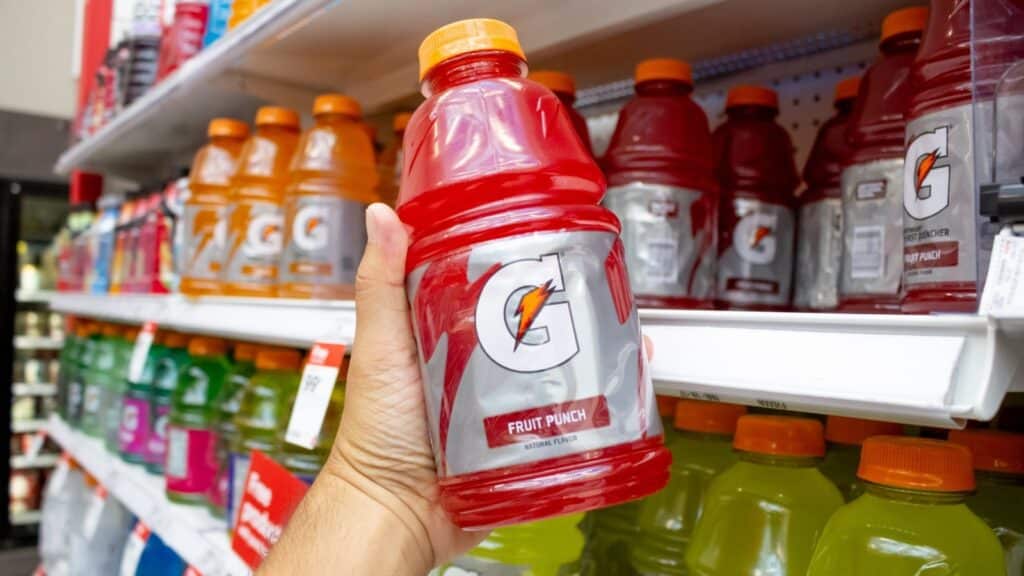
Besides the nutrition label, there are other health concerns about Gatorade Zero. We’ll discuss how it affects blood sugar and examine the possible risks of its man-made ingredients.
1. Effects on Blood Sugar
Impact on Diabetic and Pre-diabetic Individuals
For people with diabetes or pre-diabetes, Gatorade Zero may be a better choice than regular Gatorade. Unlike its sugar-containing counterpart, Gatorade Zero doesn’t raise blood sugar levels directly. This can make it easier for individuals to manage their glucose levels while still getting hydration and electrolytes.
Comparisons with Regular Gatorade
Regular Gatorade contains significant amounts of sugar, which can cause rapid spikes in blood glucose.
In contrast, Gatorade Zero uses artificial sweeteners that don’t affect blood sugar similarly.
However, some studies suggest that artificial sweeteners might influence insulin sensitivity over time, so moderation is key.
2. Artificial Colors and Additives
Potential Health Risks
Depending on the flavor, Gatorade Zero contains artificial colors like Red 40, Blue 1, Yellow 5, and Yellow 6. Some research has linked these additives to potential health issues:
- Red 40 and Yellow 5: Some studies suggest these may contribute to hyperactivity in children.
- Blue 1: Limited research indicates possible links to kidney tumors in animals.
- Yellow 6: Has been associated with adrenal gland and kidney tumors in animal studies.
FDA Guidelines and Scientific Studies
While the FDA considers these colors safe at current use levels, some experts and consumer groups argue for more research and stricter regulations.
The European Union requires warning labels on foods containing some of these dyes. The amounts in Gatorade Zero are within FDA-approved limits, but individual sensitivity can vary.
Alternative Hydration Options
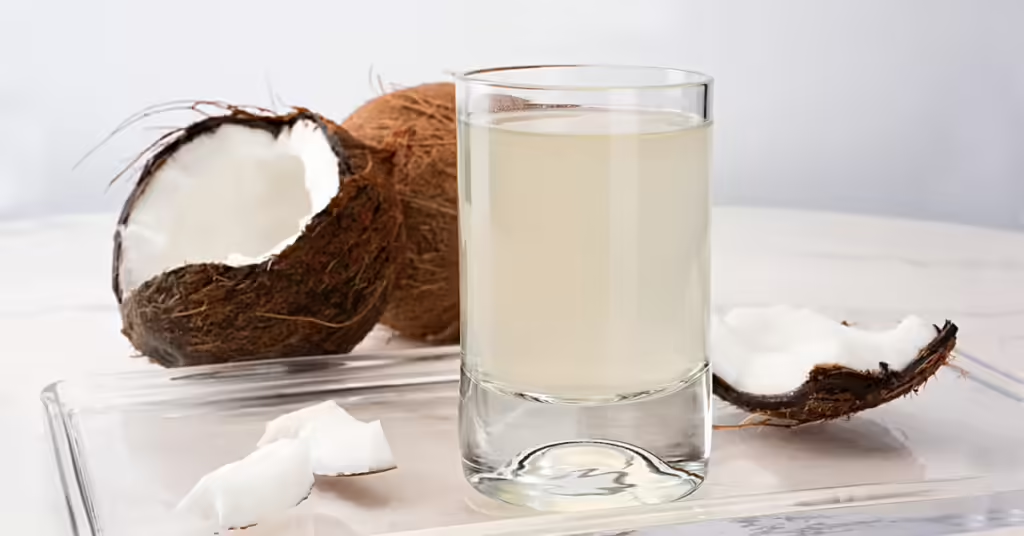
If you’re not sure about Gatorade Zero, that’s okay. We’ll show you other ways to stay hydrated, both natural and store-bought, to help you pick what’s best for you.
Natural Alternatives
Coconut water is a popular natural alternative to sports drinks. It’s rich in electrolytes, especially potassium, and provides a mild, sweet flavor without artificial additives.
You can also make your own sports drink at home using water, a pinch of salt, a squeeze of lemon or lime, and a small amount of honey or fruit juice for natural sweetness.
Some brands offer electrolyte-enhanced water without artificial sweeteners or colors. These products can provide the hydration and mineral replenishment of sports drinks in a more natural form.
Commercial Alternatives
Several companies now offer low-sugar or sugar-free sports drinks as alternatives to Gatorade Zero.
These often use different sweeteners or natural flavors to achieve a palatable taste while minimizing calorie content.
Different hydration products have their strengths and weaknesses
- Electrolyte tablets: Easy to carry and mix with water but may contain artificial sweeteners.
- Plant-based sports drinks Often use natural ingredients but can be more expensive.
- Protein-infused waters: Provide added nutrients but may not be ideal for all types of exercise.
Consider ingredient quality, electrolyte content, taste preferences, and specific exercise needs when choosing a hydration product.
Remember, plain water remains an excellent, cost-effective choice for staying hydrated during most daily activities and moderate exercise.
Summing It Up
So, is Gatorade Zero good for you? The answer isn’t black and white. While it offers zero sugar and electrolyte replenishment benefits, it also contains artificial sweeteners and colors that raise some health concerns.
Gatorade Zero can be helpful for intense workouts or hot conditions. However, water is often your best bet for everyday hydration.
Remember, your hydration needs are unique. When choosing a drink, consider your activity level, health goals, and personal preferences. If you’re unsure, talk to a healthcare professional or nutritionist.
Whether you choose Gatorade Zero or an alternative, staying hydrated is key to your health and performance.
Make informed choices, listen to your body, and don’t be afraid to explore different options to find what works best for you.
Frequently Asked Questions
1. Is it okay to drink Gatorade Zero every day?
While Gatorade Zero is low in calories and sugar, drinking it daily may not be ideal. It contains artificial sweeteners and colors, which some studies suggest could have long-term health effects.
For most people, water is a better choice for everyday hydration. Moderation is key with any flavored drink.
2. What are the benefits of Gatorade Zero?
Gatorade Zero provides electrolytes like sodium and potassium without added sugar or calories.
This can help replace minerals lost through sweat during intense exercise or in hot weather.
It’s a good option for people watching their calorie or sugar intake who still want the hydration benefits of a sports drink.
3. Does Gatorade Zero raise blood sugar?
Gatorade Zero doesn’t directly raise blood sugar levels because it contains no sugar. This makes it a better choice than regular Gatorade for people with diabetes or those watching their blood sugar.
However, some studies suggest artificial sweeteners might affect insulin sensitivity over time, so moderation is still important.
4. Does Gatorade Zero have fake sugar in it?
Yes, Gatorade Zero contains artificial sweeteners. It uses sucralose and acesulfame potassium to provide sweetness without calories or sugar.
These FDA-approved sweeteners are much sweeter than regular sugar, allowing the drink to taste sweet while remaining calorie-free. However, some people prefer to avoid artificial sweeteners due to potential health concerns.

